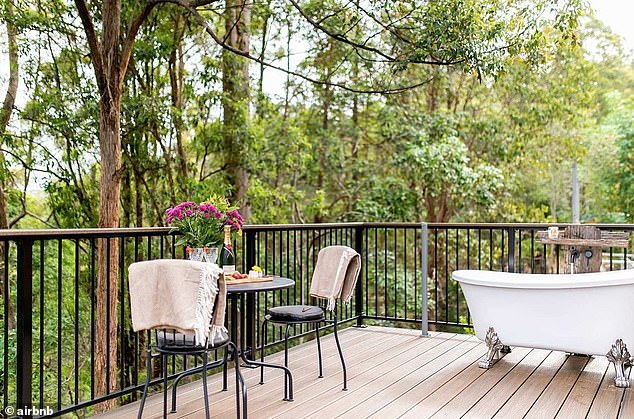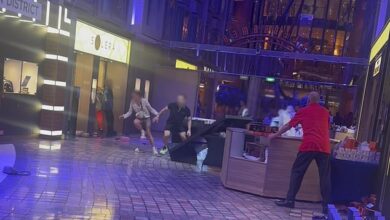Kate and Rob Foster run the Dreamy Escapes retreat… they had no idea what to do when these guests showed up on their doorstep

A couple who run a vacation home were stunned when strangers turned up claiming to have made a reservation, when there was no record.
Kate and Rob Foster, owners of Dreamy Escapes, said they were confused when so many tourists showed up at the door.
The duo run a holiday home consisting of several properties on a 10-acre site in Hunchy, on the Sunshine Coast.
The tourists explained to Mr. and Mrs. Foster that they had booked the Wunya Tiny House, a two-bedroom cottage specifically for couples, through Booking.com.
The couple had no idea what they were talking about and sent the strangers away, as the accommodation had already been booked by other guests.
Mr and Mrs Foster soon discovered that a scammer had created two fake property advertisements and was taking false bookings.
As a result, the travelers lost their money and had no place to stay.
This isn’t the first incident for the couple, as Kate and Rob’s company has been targeted several times before.

The travellers claimed they had booked the Wunya Tiny House (pictured) run by Dreamy Escapes Accommodation in Hunchy, on the Sunshine Coast
In July alone, the scammers created four separate ads.
Mr and Mrs Foster said they felt helpless after numerous guests, who had made similar bookings, turned up only to find the property was fully booked.
“There was a couple crying because they were so devastated,” Mrs Foster told the ABC.
The couple believes the booking information, including their logo and photos of the property, was copied from their Airbnb listings.
The company’s owners had previously listed the property on their website, but cancelled it over a year ago.
The last two advertisements stated that the property was located at different addresses on the same road.
Dreamy Escapes are advertised as ‘luxurious and peaceful’ retreats, ideal for singles and couples to ‘rest, heal, create and nourish themselves from within’.
According to the company’s website, Mr. and Mrs. Foster are yoga teachers and family constellation therapists.
The couple also host various wellness workshops on the Sunshine Coast.
Major online accommodation platforms worldwide are being attacked by scammers and hackers, many of whom are using artificial intelligence (AI) to carry out their attacks.
Marnie Wilking, Chief Information Officer at Booking.com, said scams have increased by 500 to 900 percent in the past 18 months.

Kate (pictured left) and Rob Foster (pictured right) discovered the tourists were victims of a fake online advertising scam after they were forced to turn the travellers away
The Scamwatch website, which is operated by the ACCC, recorded 363 cases of scams involving Booking.com in 2023.
Australians lost more than $337,000 to this scam.
According to Cassandra Cross, a professor at the Queensland University of Technology, scammers target online accommodation services because so many people use them.
Professor Cross said it was difficult for accommodation service companies to stop fake adverts because so many properties were advertised every day.
“The ability for offenders to copy and create these fraudulent messages far outweighs the ability of platforms to remove them,” Professor Cross said.
Mr and Mrs Foster said they couldn’t report the fake listings because they don’t have a Booking.com account.
The couple reported the issue to the ACCC and also sent multiple emails to Booking.com and made several phone calls to customer services.
The duo checks the Booking.com website every day to detect fake advertisements.

The couple claimed they had made a reservation for the property on Booking.com, but that the company had not created a listing to advertise the property (stock image)
“We couldn’t stop people from booking there and we couldn’t stop people from knocking on our existing guests’ doors. So it was a very difficult situation,” Mr Foster said.
According to the couple, the ads were on the website for a week before being removed, but they were unable to verify this with the company.
A Booking.com spokesperson said they take several security measures to detect scams and take immediate action to remove fake listings.
Daily Mail Australia has contacted Booking.com for further comment.




